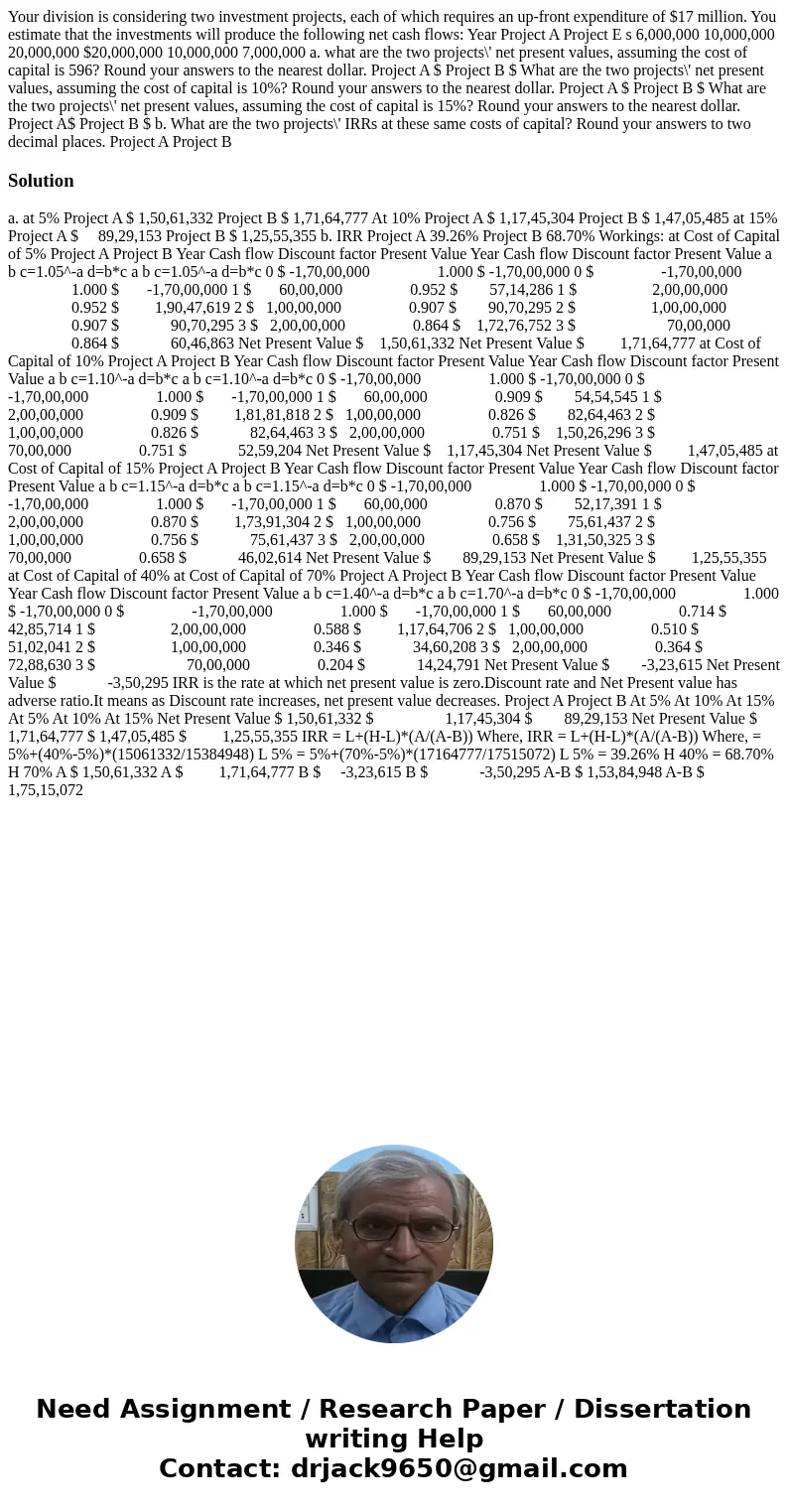Your division is considering two investment projects each of
Your division is considering two investment projects, each of which requires an up-front expenditure of $17 million. You estimate that the investments will produce the following net cash flows: Year Project A Project E s 6,000,000 10,000,000 20,000,000 $20,000,000 10,000,000 7,000,000 a. what are the two projects\' net present values, assuming the cost of capital is 596? Round your answers to the nearest dollar. Project A $ Project B $ What are the two projects\' net present values, assuming the cost of capital is 10%? Round your answers to the nearest dollar. Project A $ Project B $ What are the two projects\' net present values, assuming the cost of capital is 15%? Round your answers to the nearest dollar. Project A$ Project B $ b. What are the two projects\' IRRs at these same costs of capital? Round your answers to two decimal places. Project A Project B 
Solution
a. at 5% Project A $ 1,50,61,332 Project B $ 1,71,64,777 At 10% Project A $ 1,17,45,304 Project B $ 1,47,05,485 at 15% Project A $ 89,29,153 Project B $ 1,25,55,355 b. IRR Project A 39.26% Project B 68.70% Workings: at Cost of Capital of 5% Project A Project B Year Cash flow Discount factor Present Value Year Cash flow Discount factor Present Value a b c=1.05^-a d=b*c a b c=1.05^-a d=b*c 0 $ -1,70,00,000 1.000 $ -1,70,00,000 0 $ -1,70,00,000 1.000 $ -1,70,00,000 1 $ 60,00,000 0.952 $ 57,14,286 1 $ 2,00,00,000 0.952 $ 1,90,47,619 2 $ 1,00,00,000 0.907 $ 90,70,295 2 $ 1,00,00,000 0.907 $ 90,70,295 3 $ 2,00,00,000 0.864 $ 1,72,76,752 3 $ 70,00,000 0.864 $ 60,46,863 Net Present Value $ 1,50,61,332 Net Present Value $ 1,71,64,777 at Cost of Capital of 10% Project A Project B Year Cash flow Discount factor Present Value Year Cash flow Discount factor Present Value a b c=1.10^-a d=b*c a b c=1.10^-a d=b*c 0 $ -1,70,00,000 1.000 $ -1,70,00,000 0 $ -1,70,00,000 1.000 $ -1,70,00,000 1 $ 60,00,000 0.909 $ 54,54,545 1 $ 2,00,00,000 0.909 $ 1,81,81,818 2 $ 1,00,00,000 0.826 $ 82,64,463 2 $ 1,00,00,000 0.826 $ 82,64,463 3 $ 2,00,00,000 0.751 $ 1,50,26,296 3 $ 70,00,000 0.751 $ 52,59,204 Net Present Value $ 1,17,45,304 Net Present Value $ 1,47,05,485 at Cost of Capital of 15% Project A Project B Year Cash flow Discount factor Present Value Year Cash flow Discount factor Present Value a b c=1.15^-a d=b*c a b c=1.15^-a d=b*c 0 $ -1,70,00,000 1.000 $ -1,70,00,000 0 $ -1,70,00,000 1.000 $ -1,70,00,000 1 $ 60,00,000 0.870 $ 52,17,391 1 $ 2,00,00,000 0.870 $ 1,73,91,304 2 $ 1,00,00,000 0.756 $ 75,61,437 2 $ 1,00,00,000 0.756 $ 75,61,437 3 $ 2,00,00,000 0.658 $ 1,31,50,325 3 $ 70,00,000 0.658 $ 46,02,614 Net Present Value $ 89,29,153 Net Present Value $ 1,25,55,355 at Cost of Capital of 40% at Cost of Capital of 70% Project A Project B Year Cash flow Discount factor Present Value Year Cash flow Discount factor Present Value a b c=1.40^-a d=b*c a b c=1.70^-a d=b*c 0 $ -1,70,00,000 1.000 $ -1,70,00,000 0 $ -1,70,00,000 1.000 $ -1,70,00,000 1 $ 60,00,000 0.714 $ 42,85,714 1 $ 2,00,00,000 0.588 $ 1,17,64,706 2 $ 1,00,00,000 0.510 $ 51,02,041 2 $ 1,00,00,000 0.346 $ 34,60,208 3 $ 2,00,00,000 0.364 $ 72,88,630 3 $ 70,00,000 0.204 $ 14,24,791 Net Present Value $ -3,23,615 Net Present Value $ -3,50,295 IRR is the rate at which net present value is zero.Discount rate and Net Present value has adverse ratio.It means as Discount rate increases, net present value decreases. Project A Project B At 5% At 10% At 15% At 5% At 10% At 15% Net Present Value $ 1,50,61,332 $ 1,17,45,304 $ 89,29,153 Net Present Value $ 1,71,64,777 $ 1,47,05,485 $ 1,25,55,355 IRR = L+(H-L)*(A/(A-B)) Where, IRR = L+(H-L)*(A/(A-B)) Where, = 5%+(40%-5%)*(15061332/15384948) L 5% = 5%+(70%-5%)*(17164777/17515072) L 5% = 39.26% H 40% = 68.70% H 70% A $ 1,50,61,332 A $ 1,71,64,777 B $ -3,23,615 B $ -3,50,295 A-B $ 1,53,84,948 A-B $ 1,75,15,072
 Homework Sourse
Homework Sourse